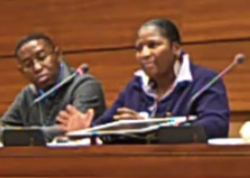Bringing Human Rights issues from the Gulf Coast to Switzerland
 “My name is Sharon Hanshaw… I’m a native of Biloxi, Mississippi. I was a cosmetologist for twenty-one years… and Hurricane Katrina hit. Hurricane Katrina just sped my life into this whirlwind of activism. I had no choice but to step up, and try to make sure that our voices were heard in the recovery process, now and in the future.”
“My name is Sharon Hanshaw… I’m a native of Biloxi, Mississippi. I was a cosmetologist for twenty-one years… and Hurricane Katrina hit. Hurricane Katrina just sped my life into this whirlwind of activism. I had no choice but to step up, and try to make sure that our voices were heard in the recovery process, now and in the future.”
This is how I began my talk to members of the international human rights community in Geneva, Switzerland this November, where I traveled to talk about human rights violations the United States committed on its citizens after Hurricane Katrina.
Watch my entire talk here:
My trip was sponsored by the US Human Rights Network, as part of a delegation that testified on behalf of displaced persons about the non-recovery process after Hurricane Katrina. My first trip to Geneva with the US Human Rights Network was in November, 2009.
My desire to be a part of this process is my belief that grassroots folk’s voices need to be heard across the Gulf Coast region. We have not yet recovered from Katrina and now we’re faced with another disaster, the BP oil disaster. We’re the experts and should always be at the decision making table.
That’s why I feel so strongly about being a part of the Universal Periodic Review session, when the United Nations Human Rights Council reviews the United States human rights record (learn more about the UPR here). In January 2010 we conducted the outreach and participated in a meeting with the Obama administration about Human Rights violations, at Xavier University in New Orleans. I also contributed to the drafting of the shadow report on human rights in the aftermath of Hurricane Katrina (download the report here).
Our goal is to continue to share resources collectively for all human being across the board. You can help by sharing our stories to all people and make other aware of the injustices that still exists.
Here are more excerpts from what I shared in Geneva:
“The displaced residents, the displaced communities that had to leave because their homes were destroyed, they could have come back sooner and faster if the local government and the local municipalities [had] just rebuilt communities and not brought developers in to build casinos and new tourism avenues. I’m not against jobs and economic development, but homes come first, people come first. And people didn’t come first [in Katrina recovery].
When I think about the young women that came to us, 'Where can I go? Where can I stay? Where can I work? Where can my children—' there was so much coming at us…I knew then that we had to do something different. While we doing all this, trying to network and trying to get ourselves together, we knew we had to become a body of people, united. So we started talking together, the women started meeting, and started discussing, 'What do we want to see our community look like, in the future?'...
So the first thing we did was we started meeting, and started meeting at the local municipality, and let them know we want economic development, we want our seniors back, we want our displaced individuals to have homes to come back to. But the affordable homes just never came fast enough. There’s still not enough to this day…
When you talk about how can we rebuild as a country, and we still have people in poverty, it is a major step to think about, 'How can we do this together?' So I’m very happy that I’m at this setting, so people can galvanize with this and help and give us resources to build, as the world, not just the Gulf Coast region.”
---------
Related Post: Check out this NPR story about Sharon Hanshaw and the hard fight on the Mississippi Gulf Coast
Sharon Hanshaw is Executive Director of Coastal Women for Change, in Biloxi, Mississippi. A native of Biloxi, Sharon worked as a cosmetologist for 21 years. She got involved in community organizing and activism after Hurricane Katrina, working to make sure that community members are decision makers in the recovery process. Coastal Women for Change (CWC) focuses on women's empowerment and community development through programs for the elderly and children.
